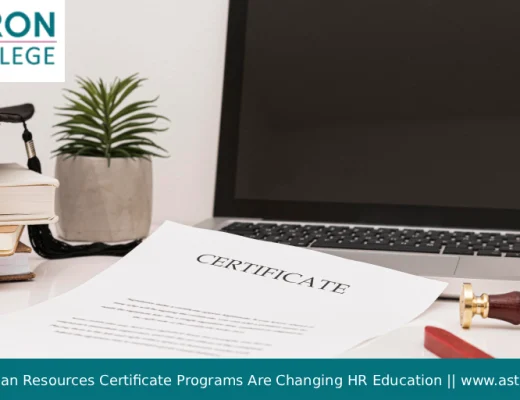The world of labor is changing at a record speed. The appearance of new technological changes, a form of hybrid and remote working, a greater focus on employee well-being, and diversity are transforming the way organizations executed their work. The current highly changing environment has made it impossible to practice the conventional skills and apply only the conventional practices in the field of HR professionals. They must establish themselves as strategic partners helping in the advancement of culture, engagement, and change throughout the organization. Consequently, human resource certificate programs are also changing to cover advanced issues such as data analytics, digital instruments, DEI initiatives, and mental health assistance. The HR leaders have now to keep certified and up to date in order to continue to be an influence factor.
How are Human Resources Certificate Programs Evolving to Meet New Demands?
Shifting from Administrative to Strategic
Conventionally, the HR was viewed as administrative area of interest concerned with adherence to guidelines, tracking and other routine human labor provisions. Nevertheless, the current operations clearly state that the organizations require HR to be a strategic partner, prominent contender of the culture creation, encouragement of innovation and enhancement of general business goals. The human resources certificate programs have more modules that touch on strategic leadership, workforce planning and organizational change management. With skills, the HR professionals stop acting as assistants and become advisors with strong impact on important decisions. The change emboldens them to place people strategies and business goals in tandem; enhance amongst others employee engagement and lead in the long-run competitiveness and success of their firms.
Integrating Technology and Data Analytics
Since technology is redefining all parts of the business, HR is not an exception but transformed into more data-driven, technology-enabled functions. HR certifications are now encompassing extensive learning about HR analytics, HR-specific digital systems, and recruiting, monitoring performance, and including employees through AI-powered services and tools. The skills allow professionals to transform complicated data to relevant aids, individualize the employee experience, and maximize talents approaches. Technology and analytics are also ways through which a certified HR professional can master to decide better, predict workforce requirements, and play a more significant role. This transformation guarantees their survival in a world in which data-driven, agile, and technological-oriented HR practices are the key to the growth of organizations.
Focus on Diversity, Equity, and Inclusion (DEI)
Today’s workers and stakeholders expect organizations to embed diversity, equality, and inclusion (DEI) as fundamental principles and not as voluntary programs. DEI training has thus been a preeminent focus in current HR certification courses, which offer blueprints and practical strategies for building truly inclusive cultures. Through such seminars, HR directors can acquire the knowledge on how to recognize and overcome unconscious prejudice, create equitable policies, and build workplaces where everyone is valued and heard. Certified HR professionals are better equipped to lead organizational culture transformation and foster a sense of belonging. By advocating DEI, they enhance staff retention and morale as well as the company’s long-term achievement and reputation.
Addressing Employee Well-Being and Mental Health
Beyond conventional benefits and bonuses, employee well-being and mental health have emerged as crucial considerations in today’s companies. These days, work-life balance, stress reduction, and mental health support are all emphasized in human resource certificate programs. Practical methods for developing resilient teams, establishing encouraging policies, and cultivating a compassionate, human-centered workplace culture are all covered in the courses. HR specialists with training in these fields are prepared to create wellness programs, spot burnout early, and encourage psychological safety. Certified HR executives assist companies in increasing employee engagement, decreasing attrition, and creating more sustainable, productive, and healthy work environments by putting employee well-being first.
Conclusion
As the workplace continues to transform rapidly, HR professionals must evolve beyond traditional practices to become strategic drivers of culture, innovation, and employee well-being. At Astron E-College, we understand that the future of HR requires more than just foundational knowledge, it demands strategic thinking, tech expertise, and a human-centered approach. Our comprehensive human resource certificate programs are designed to equip you with the latest skills in HR analytics, digital tools, diversity and inclusion strategies, and employee well-being.


